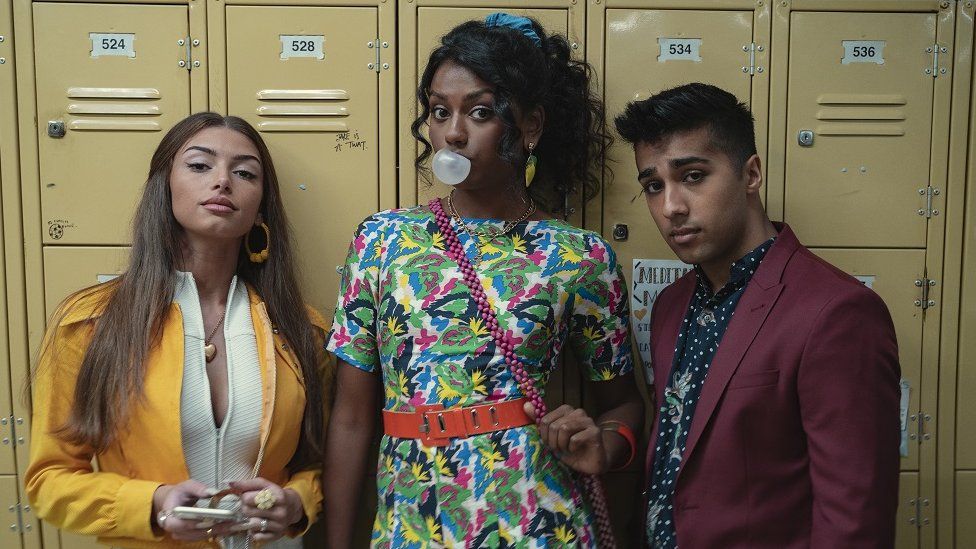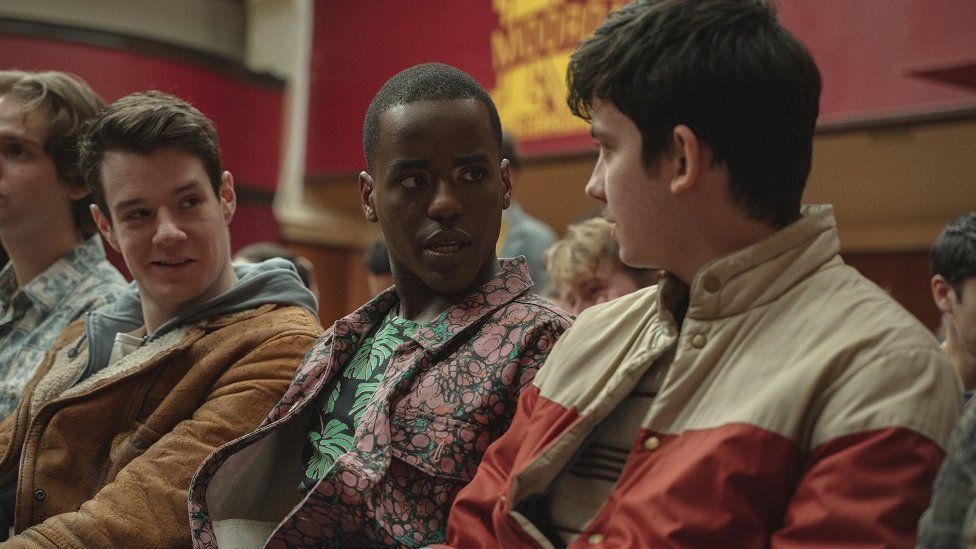Before ‘Many Saints of Newark,’ it’s worth revisiting key moments from the original series—scenes that prove how funny, profound, and gut-wrenching it could be
A word of warning: Your favorite scene from The Sopranos is probably not on this list. Yes, that one—the scene whose absence immediately invalidates everything you’re about to read. Poor you.
The thing about lists of great moments from canonical shows is that they’re always wrong. Still, the futility of the exercise comes with its own form of validation. You could probably ask 100 die-hard fans to each list the key scenes from The Sopranos and get minimal crossover: This shows not only the sheer number of high points the series hit during six (and a half) seasons, but also the multitudes it contained.
For instance: If you thought The Sopranos was primarily a show about a mob boss teasing out his troubled relationship with his mother in therapy, your roll call would be heavy on Livia and Dr. Melfi; if you took it as a diagnosis of twisted masculinity, you might gravitate toward the various beatings and figurative dick-measuring contests. If you’re a literature professor, you’d tally up a running syllabus that runs the gamut from Melville to Flaubert to Yeats. Or maybe you’d just pick all the stuff with Christopher and Paulie in the woods from “Pine Barrens”—like the latter hungrily scarfing up ketchup packets while freezing half to death in a van—and call it a day.
“Pine Barrens” is not represented below, and neither are a few episodes widely and correctly considered to be among The Sopranos’ very best: “College,” “University,” “Whoever Did This,” “The Second Coming,” and “Made in America.” God forbid somebody writes another analysis of the latter’s final scene, which may be the most deconstructed four minutes in television history. The selections below give an impression of a show whose perspective was fused to a singularly complex protagonist, yet which managed incredible breadth and depth.
“Nobody Knows Anything” (Season 1, Episode 11)
In the beginning, The Sopranos was mostly a show about how a boy’s worst enemy was his mother: The common denominator between the series’ analyze-this gimmick of a Mafia boss in therapy and its proliferation of mob-genre tropes was the lurking threat of Livia Soprano, a master manipulator living lavishly at Green Grove (not a nursing home but a retirement community) and also rent-free in her son’s head. As played by a brilliantly cast Nancy Marchand, Livia was the show’s greatest schemer, filtering Machiavellian schemes through arias of obnoxious self-pity; nobody was better at incepting bad ideas into others under the guise of idle chatter. Case in point: this miniature masterpiece from Season 1’s pivotal “Nobody Knows Anything,” with Livia letting it slip to Junior—oops—that Tony has been using Green Grove to hold off-the-book meetings with members of his crew. “I just don’t like being put in the middle of things,” she gripes, even as that’s exactly where she’s plunking herself down. Meanwhile, the thrill of watching her use Junior’s paranoia against him, jujitsu style, is offset by the real and complex sadness underpinning her decision to tattle. On one level, Livia knows that she’s signing Tony’s death warrant by implying Tony’s insubordination, but her reasons for doing so stem from deep-seated and painful feelings of abandonment. Tony doesn’t want his Ma to live with him because she’s unbearable, and deep down, she knows it. Marchand’s acting always captured the precise ratio of misanthropy to self-loathing that turned a tired old woman into a viper.
“The Knight in White Satin Armor” (Season 2, Episode 12)
The title of Season 2’s penultimate episode goofs on a 1967 hit by the Moody Blues, with Tony’s Russian girlfriend Irina conflating the song’s tragic tale of unrequited love with an ancient, Arthurian archetype of chivalry. The real damsel in distress, though, is Janice, who, having hitched her carriage to the recently paroled Richie Aprile, realizes that (1) the little guy is not up to the task of taking over Tony’s crew, and (2) he’s liable to take out his frustrations about that (and everything else) on her. And so, out of a mix of calculation, self-defense, and basic instincts inherited from a family full of killers, civilian Janice carries out what was, to that point, the single most shocking—and riotously funny—whacking of the entire series, effectively doing her brother’s dirty work for him by eliminating a dangerous rival. (Gandolfini’s expression when Tony arrives on the scene is one of his greatest moments; his flicker of joy and surprise feels genuinely involuntary and spontaneous.)
“Employee of the Month” (Season 3, Episode 4)
This might be the most hair-raising line reading ever on The Sopranos: “No.” It’s in reply to Tony’s (relatively) innocent question to Jennifer Melfi—after she’s been sexually assaulted, unbeknownst to him—if there’s anything she wants to tell him. The statement shows us something important about her character—that as much as she recognizes and desires Tony’s power, she’s unwilling to have him wield it on her behalf. At least not when she’s awake: In her slumbering unconscious, Dr. Melfi imagines Tony as an attack dog, ready to be sicced on her assailant now that his identity and whereabouts were revealed to her. By not making her dreams a reality, Melfi exercises the kind of restraint that allows her to feel like she’s different than Tony, and yet the scene’s emotional power comes out of Tony’s distinctly humane concern and empathy. In a beautiful piece of staging, Tony actually rises from his chair and crosses the imaginary axis in the center of Melfi’s office, collapsing the professional distance between therapist and patient in a gesture of chivalry and kindness. It’s hard not to like Tony here, and harder still not to fantasize about what he might do if he ever ran across the despicable “employee of the month.” But he won’t. Melfi’s curt, hard-edged reply guarantees that. And then, with nowhere else to go in a plot arc, we cut to black.
“Second Opinion” (Season 3, Episode 7)
The difference between enablement and good advice from a therapist gets measured in Season 3’s superlative “Second Opinion,” which finds Carmela seeking professional help to assuage her guilt over her complicity in Tony’s crimes. But Sully Boyar’s acerbic Dr. Krakower offers only a cold shoulder to cry on—and his client’s crocodile tears freeze on impact. In lieu of absolution, the good doctor lays things out with the sort of blunt clarity that Dr. Melfi has long since abandoned. The contrast is intentional. If Melfi was to some extent an audience surrogate, measuring her attraction and interest in Tony against her recognition of his basically evil nature, then Krakower is the equivalent of the guy who takes pride in not watching The Sopranos at all. (He probably doesn’t even own a TV.)
“Many patients want to be excused for their current predicament because of events that occurred in their childhood,” he chides Carmela, implicitly critiquing Melfi’s MO. What he’s preaching is nothing less than the gospel of accountability, and his one-scene appearance—which concludes with him flatly advising Carmela to take the kids (“or what’s left of them”) and leave her mansion subsidized by blood money—hangs over the rest of the series. It’s no coincidence that David Chase gave his truth-teller the same surname (spelled differently) of Siegfried Kracauer, whose work critiqued Western capitalism and probed the roots of fascism in his native Germany. It’s a high-minded reference for a scene that plays like a pop-culture phenomenon’s greatest confrontation with its own loyal fan base.
“Army of One” (Season 3, Episode 13)
Paulie’s sit-down with Ralphie over the matter of $50,000 is not a particularly important scene in the history of The Sopranos, or even within the flow of the all-time great episode “Army of One,” which juxtaposes the trajectories of A.J. Soprano, who’s flunking his way toward a date with military school, and Jackie Jr., who’s just been killed off for robbing a weekly card game. In fact, part of what makes the scene so amusing is how little patience Tony—who’s preoccupied with the problems of both boys—has for his underlings’ mutual bitching. But sometimes a scene doesn’t have to be important to be great. It can just be relentlessly, pricelessly funny. Every single element here is perfectly calibrated: Paulie’s sputtering rage; Ralphie’s taunting contempt; Sil’s haplessly placating vibe; the tacky outdoor cafe setting; poor, shot-up Furio’s slapstick face-plant on the ice, complete with hysterical Neapolitan curse words.
A word of respect for Joe Pantoliano on his only appearance on this list: Nobody in the show’s ensemble did hateful better than Joey Pants, mainly because he understood that hatefulness is a many splendored thing. Ralphie’s frankly despicable response to his quasi-stepson Jackie’s death (which he ordered) is to complain that it’s made the kid’s mother so sad he can’t get any sleep at her place, and yet it’s impossible to watch him mocking Paulie and not smile at the character’s skill at twisting the knife. “I don’t believe this!” Paulie exclaims at Tony’s verdict. “Why not?” Ralphie smirks. “Last year, you believed that a flying saucer was over East Rutherford.” [Mortal Kombat voice]: Flawless Victory.
“The Strong, Silent Type” (Season 4, Episode 10)
“Let he who is without sin cast the first stone” is a nice idea, but it doesn’t work in the context of a Mafia intervention where nobody’s slate is clean. So instead, the efforts of Adriana, Tony, et al. to get Christopher to straighten up immediately descends into absolute chaos; in lieu of taking the high ground, the attendees just keep taking potshots. From Sil’s unsympathetic recollection of Chrissy’s struggles in the bathroom at the Bada Bing (“your hair was in the toilet water … disgusting”) to Paulie’s straight-up vicious put-down (“you’re weak”) to Tony’s escalating rage at the revelation that Adriana’s dog Cosette was collateral damage in his nephew’s latest binge, the bad vibes are contagious, despite the futile attempts of Elias Koteas’s soft-spoken facilitator. On a show in which the characters often tempered their ethical delusions with attempts at self-improvement, Christopher’s humiliation at being called on his bullshit is devastatingly well-acted by Michael Imperioli, who had an alchemical ability to rein in the character’s broad, sometimes cartoonish stupidity and expose the thoughtful, wounded insecurities underneath. Watch his face when Carmela recalls thinking that Christopher was high at Livia’s wake—it’s the look of a man who can’t even pantomime denial. The climactic fisticuffs manifest the kind of macho slapstick comedy that’s easy to laugh at, but Imperioli’s performance before all hell breaks loose is sobering stuff.
“Eloise” (Season 4, Episode 12)
You’ll notice that this list doesn’t include Silvio’s Miller’s Crossing moment with Adriana in Season 5’s “Long Term Parking,” an omission partly born out of the potential obviousness of the pick. Everyone remembers Ade’s execution, and it’s absolutely a heartbreaker, especially the choice to keep her death out of view, as if not even the camera can bear to see her gunned down. But I’ve opted instead for a less famous, but no less chilling and impactful example of an innocent who is collateral damage in what Tony and company call “this thing of [theirs]”: poor, doomed, obnoxious senior citizen Minn Matrone, who catches Paulie red-handed trying to steal her life savings from under her mattress and ends up being choked to death. “You were always a little bastard,” rasps the old lady after threatening to tattle to his mother, Nucci, a long-standing frenemy who Minn has tormented (much to Paulie’s chagrin). The woman’s hostility to Paulie’s Sainted Ma only partly justifies his improvised act of violence; the irony is in a lifelong Mama’s boy smothering a woman who could be Nucci’s mirror image. Paulie’s motives are also mercenary: He’s stealing the money to give to Tony, who had considered taking a pillow to Livia’s face back in Season 1. If one of the running jokes in The Sopranos is that its made men are really nothing more than overgrown lost boys, the show was admirably committed to showing us the grotesqueness of their middle-aged Peter Pan acts. Paulie’s base irredeemability had been established long before “Eloise,” but the scene with Minn feels cruelly definitive. What a little bastard.
“Whitecaps” (Season 4, Episode 13)
The least they could have done for Edie Falco after “Whitecaps” was give her an Emmy: Her acting in the scenes when Carmela throws Tony out of the house for his decades of cheating and a second, even nastier confrontation a few days later transcends for-your-consideration posturing. If Carmela’s encounter with Dr. Krakower in “Second Opinion” was a rare example of The Sopranos stepping outside of itself to offer a kind of meta-commentary on the series, “Whitecaps” is as immersive and visceral as the show ever got, granting its female lead a proverbial moment of clarity and then letting Falco show how painful—and rapturously, ecstatically cathartic—it is for her to act on it. Every line reading and physical gesture during the encounter is extraordinary, but what sticks out most is how Falco cinches a consistent expression of absolute recognition even as her voice and posture swing from rage to regret to resignation. She makes us see Tony through her tired, red-rimmed eyes, and the effect is wildly disconcerting.
It’s not just that Carmela calls her husband on his bullshit (”Who knew all this time you wanted Tracy and Hepburn?”) but that she briefly unburdens herself of the self-loathing that kept her quiet in the face of Tony flaunting his indiscretions. Carmela is sad here—heartsick, betrayed, and terrified—and yet she’s also palpably exhilarated by her own courage at letting it all out. “I have things to say!” she bellows, a line that sets up a Season 5 arc that finds her, sadly and inevitably, retreating from the edge of self-actualization and back into the same precise cozy, materialistic, Mafia-wife orbit that Tony accuses her of occupying during their fight. As much as “Whitecaps” asks us to take a good hard look at Tony’s faults, we also understand that he sees his wife at least as clearly as she sees him.
“Where’s Johnny?” (Season 5, Episode 3)
On a show that often reveled in the rampant malapropisms and intellectual naivete of its wiseguy characters, Junior Soprano’s one-liners were like precision strikes—always on target, and always drawing blood. Whether talking to FBI agents, his niece and nephew, or just muttering to himself, the old man was devastatingly funny. Which is why, as the series wore on, Junior’s fading mental health became such a source of pathos, as well as an unsettling, beguiling ambiguity about whether he was just playing possum. The main plot of Season 5’s “Where’s Johnny?” focuses on Junior’s worsening dementia, which leads him to wander the neighborhood, seemingly in search of his late brother. That evening, after a series of unfortunate events and arguments catalyzed by his uncle’s misadventure, Tony pays a visit. Junior is still querulous, cantankerously ordering Tony to shut the refrigerator door properly. They sit in Junior’s dimly lit living room; a nature program is on the small television and we hear narration about prairie dogs. After several questions about Junior’s health, Tony, whose need for avuncular approval is like a gaping wound, asks his uncle why everything he says has to be so “mean.” “I mean, don’t you love me?” he asks plaintively.
Tony clearly knows that Junior is fading out—foreshadowing the toothless, demented old man we’ll see at the end of the series. Junior, his mind wandering, focuses on the TV and notes: “There’s the coyote.” It’s a throwaway line that deceptively serves as a description of Junior himself—a wily, resourceful survivor and opportunistic predator—as well as the condition that’s ruthlessly stealing away his sense of self. There he is, indeed.
“Mayham” (Season 6, Episode 3)
Picking between the eponymous subconscious odyssey at the center of Season 5’s acclaimed “The Test Dream” and the Season 6 two-parter featuring a comatose Tony living a double dream life as Kevin Finnerty is a tough call. Both plotlines push the oneiric aspects of The Sopranos as far as they can reasonably go and arguably beyond; when “Mayham” aired, there were hostile responses from even die-hards who felt that it represented one purgatorial detour too many. In retrospect, though, the whacking and showdowns were mostly what we sat through in order to get to the good stuff like this.
After getting stranded without his wallet or ID on an out-of-town business trip, the erstwhile Mr. Finnerty is offered the chance to return “home”—a location represented by an idyllic yet terrifying country estate guarded by the ghost of the dearly departed Tony Blundetto. Steve Buscemi’s smiling line readings evoke his bellhop-of-the-damned character from Barton Fink, and the idea seems to be that by entering the premises, Tony (as Kevin) is entering his own personal hell. In the space of just a few minutes, writer Matthew Weiner and director Jack Bender score a series of visual and conceptual knockouts around the themes of mortality and acceptance that always lurked beneath the series’ narrative intrigue. Tony’s terror at glimpsing the out-of-focus specter of Livia stalking the house gives way to his relief at being called back to the land of the living by Meadow’s voice, which wakes him from his nightmare once and for all. With its rich, horror-movie imagery and life-or-death stakes, the scene is a distillation of everything that’s scary, existential, and original about the show’s vision.
“Stage 5” (Season 6, Episode 14)
A word about Frank Vincent as Phil Leotardo: Scene for scene, rant for rant, Uncle Philly might be the nastiest antagonist on The Sopranos, just lacking Richie’s drive, Ralphie’s wit, and Johnny Sack’s manicured elegance. What drives Phil is a seething, insatiable contempt for anybody in the game who hasn’t made the sacrifices he has to his omertà—as he’s so fond of reminding people, he did his 20 years in the can and never made a peep about it, like a man. He’s so old school he’s sociopathic, and Vincent’s decision to play the character as a blunt instrument hammering away in the name of mob traditionalism is brilliant, especially when combined with his knack for embodying the worst kinds of macho hypocrisy.
The closest the show ever got to truly humanizing Phil was the coda to Season 6’s tragic “Stage 5.” At a private party meant to celebrate his ascent, he instead focuses on the clerical error at Ellis Island that rebranded his family’s surname from Leonardo—an avatar of Old World brilliance and artistry—to what Phil calls a “ballet costume”; what a difference one consonant makes. For Phil, that substitution is at the heart of all his perceived bad luck, and, glancing angrily at the photos above the bar of Johnny and his late younger brother Billy—the latter killed by “that animal” Tony B. and never satisfactorily avenged—he resolves to rewrite his story. “No more of this,” he promises Butchie, as John Cooper Clarke’s aggressively vexed song-poem “Evidently Chickentown” fades in, its anxious percussion promising us that, as the show enters the homestretch, there will be blood.
“Kennedy and Heidi” (Season 6, Episode 18)
The strange beacon perceived by Tony in his dream life as Kevin Finnerty pops up a few more times in the final season of The Sopranos: It’s glimpsed flashing against the Paris skyline by Carmela in “Cold Stones,” who doesn’t glean its significance, and again as a blinding solar flare during the desert-set outro of “Kennedy and Heidi” as a sweaty, disheveled, peyote-addled Tony looks to the heavens for a sign. “Same principle as the solar system,” he’d informed his female companion during a winning streak at Vegas’s roulette tables. The sense that, by the end, the character and the series were grasping for something cosmic finds its apotheosis in the episode’s vision-quest imagery. Tony believes his good luck is a direct result of killing Christopher and that he extinguished his erratic nephew as a source of bad juju, yet Tony is trapped in his own vicious circle, a vortex of monstrous rationalizations that keep him from making any moral progress.
Same principle as the solar system, and at the end of “Kennedy and Heidi,” Tony’s worldview finally goes supernova. Crying out “I get it” as he and his latest tryst gaze into the horizon, he’s literally blinded by the light, which in turn keeps him from actually seeing it.






/cloudfront-us-east-1.images.arcpublishing.com/gray/Y3GTNPNWJZFAZCW3Z7PCZ5XABU.JPG)
/cdn.vox-cdn.com/uploads/chorus_image/image/69930127/sopranos_scenes_hbo_ringer.0.jpeg)







